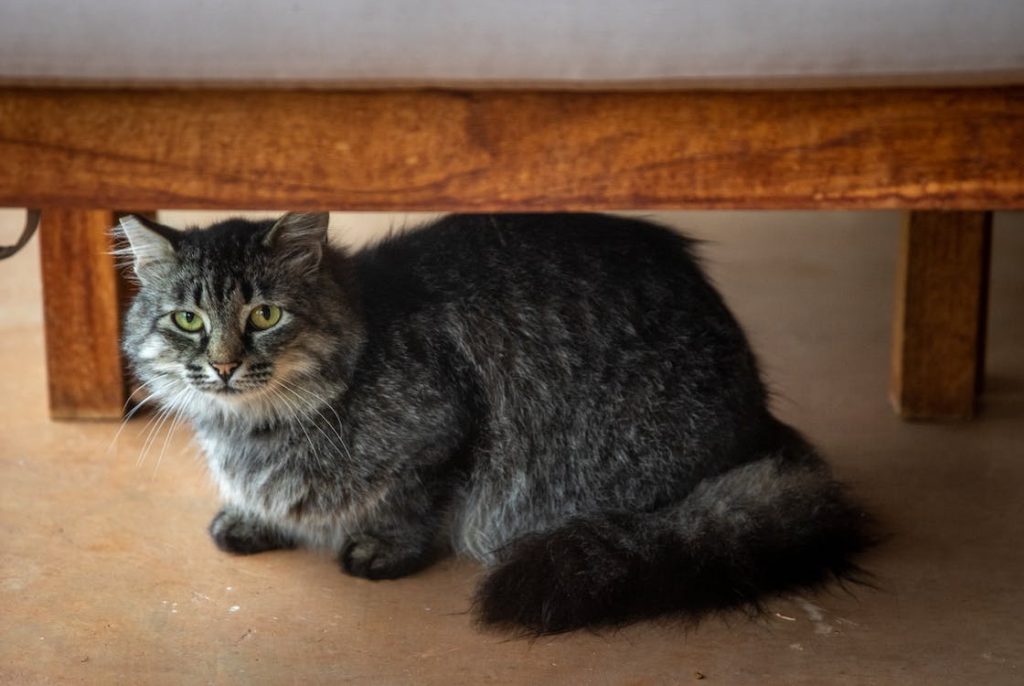Last updated on February 6th, 2023 at 12:18 am

Cats are very playful creatures, and they sometimes tend to hide for various reasons. It can be annoying and frustrating to the owner, who has difficulty tracing their whereabouts. One of the best hiding spots for cats is under the bed; and getting them out can be challenging. Dive in to find reasons for a cat hiding under bed, how to get them out, and ways to prevent this from happening.
Why Is My Cat Hiding Under Bed?
1. They feel safe
Your cats prefer to take their naps in dark areas like under beds or wardrobes since they feel at ease there. They are aware that nothing harmful can ambush them and harm them. Although house cats have nothing to worry about from their surroundings, this survival instinct is vital, particularly under stress. The best way to prevent people from disturbing their sleep is to hide.
2. Visitors around the house make them uncomfortable
A Cat hiding under the bed gives it a sense of security, whether it’s because they’re an unfamiliar family member and are wary of their new environments and people, or because they’re afraid of loud noises, another pet, loud noises, or something else.
3. The cat is scared
A Cat hiding under the bed gives it a sense of security, whether it’s because they’re an unfamiliar family member and are wary of their new environments and people, or because they’re afraid of loud noises, another pet, loud noises, or something else.
Let’s say if you have a family of cats, be mindful of the possibility that one of them may be hiding if there is any conflict between your cats. Close the curtains as this will aid lessen any cause of worry out of the house, for instance, if they are disturbed by a neighborhood cat passing by the window. Ensure your pet can access a secure area and their materials because if they sense danger, they’ll want to hide away. Remember that one of the cats may prevent the other from getting to the water, litter box, or food.
4. They crave alone time
Cats only hang around you if they want; therefore, it is normal for them to hide to have time alone. If your cat does not display distress or illness signs, it is okay to let them have their space.
5. There has been a change in routine
When you adjust your routine, this can affect your cat. Cats are animals of habit, so when your schedule frequently alters, this could frustrate them. Changing how you usually do things due to being busy means you have less time for your furry friend. Therefore, the cat hiding under bed behavior since it is not used to the new changes.
6. Your cat might be sick
Your cat hiding under bed may be a result of sickness. When they are unwell, most animals have a propensity to hide. If a cat feels ill or is hurt, it may seek refuge under the bed or elsewhere that is quiet and dark. You should keep an eye on your cat’s behavior in such a situation and, if necessary, take action to ease her discomfort. Call your veterinarian and seek advice when your cat starts throwing up and runs under the bed.
Also read: Top 15 Common Cat Health Problems
7. The cat is stressed/anxious
When in stress/anxious, they tend to hide and isolate themselves. Often, distressed cats may have appetite changes, issues with digestion, excessive grooming, or even display aggression. If your cat hides away and shows anxiety symptoms, it is best to see a vet.
8. Your cat is dying
Your cat may hide if they are almost dying just as they are ill; their instinctive nature is to do so when they feel vulnerable and weak. If this happens, first is to consult with your veterinarian. Then find ways to comfort them, like offering treats and being nearby.
9. Your cat is close to giving birth
If your pregnant cat hiding under bed, its due date may be approaching. Under the bed is a safe, dark, and conveniently defendable location that mother cats actively seek out for giving birth. Therefore, if your cat is pregnant, you might find kittens underneath the bed.
RELATED: How To Take Care Of Your Pregnant Cat?
Ways to get a cat out from under the bed
1. Give your cat some treats or food
Try placing treats, catnip, or food next to the bed and wait nearby in silence until your cat emerges to eat if your cat is acting particularly frightened or timid. It can be a great way to make your cat feel more at home when you get a new cat settling in. Give your cat room to eat quietly and return to the bed if it so chooses. Your cat will probably start to feel secure and spend more time outside once you go through this process a few times.
2. Make a cat call
Calling your cat might be enough to get them to come out if they are already accustomed to you.
3. Use a toy to draw your cat outside
Try dangling and shaking your cat’s favorite toy, such as a string-based fishing lure, in its field of vision. Toys that make noise, like bell toys, may work incredibly well to get a cat hiding under bed. Place the toy close to the bed’s edge. Once the cat begins to play with it, gradually move back to entice them.
4. Stay patient
It is crucial to exercise patience with the cat. Letting a new cat hide for a while can make them feel safer as you try to grow accustomed to your home. Don’t try to force them out if there isn’t an immediate need.
5. Shut the bedroom door
If the new place is bigger than the one your cat is used to, they might feel overpowered. It may make your cat feel more comfortable and entice them to emerge from the bed and explore if you restrict their area to just one room.
6. Ensure there is no noise
Reduce the amount of noise in the space and keep kids and other animals away until your cat feels less anxious and overwhelmed. Attempt to drown out other, more ominous noises by playing some calming music to help the cat focus and become distracted.
7. Make use of calming pheromone spray
Get a bottle of Feliway or a comparable tranquilizer for cats from your veterinarian or a pet supply store. Apply the spray to the space. Apply the rush to the area. Place a treated towel in a box made of cardboard or spritz some spray on the cat bed before placing it close to your bed.
8. Switch on the vacuum cleaner
The sound of a vacuum cleaner works wonders to quickly get a cat hiding under bed. Please turn on the vacuum cleaner and place it next to the bed. When they hear it, most cats will run out.
9. Utilize a broom to sweep beneath the bed
Try gently sweeping a broom back and forth under the bed to scare your furry friend out. If your cat is strong enough to climb the box spring, this might not work.
How to stop your cat from going under the bed in the future?
1. Don’t let them into your bedroom
You might want to think about shutting your bedroom door if your cat consistently manages to get under the bed. Once your cat enters below the bed, getting it out can be very challenging. If your cat has grown accustomed to spending a lot of time under the bed, shutting the door might be the best course of action.
2. Offer alternate hiding spots
It’s crucial to give your cat access to additional hiding spots for when they feel the need for some alone time. Make sure the hiding places you design are warm, quiet, and secure. Place the new sleeping spots in areas with little foot traffic. You could use toys, catnip, and blankets to help your cat get used to their new sleeping areas.
3. Utilize essential oils
Some essential oils are disliked by cats, usually because of their overpowering fragrance. Making the area under the bed less welcoming for your cat is as easy as spraying it with essential oils like non-toxic citronella. It will need to be sprayed several times daily for the 1st few days as your cat uncovers other hiding places because the scent of the oil quickly wears off. Although distinctive cats react to essential oils differently, they typically find the smells strong, which is a helpful way to keep cats out of specific areas. You must use essential oils safely because some of them are harmful.
4. Use under-bed blockers
The best way to prevent cats from hiding under the bed is to block their access with under-bed blockers. They come in various forms, sizes, and shades, are reasonably priced, and are simple to position. They merely serve as a bumper to seal the space around the bed’s edge. You can even make these blockers yourself at home through the following ways:
Boxes made of cardboard can also be practical. You can use massive dual-sided tape to glue them all around the opening by trimming them to the proper width and height. If you have an abundant supply of worn-out old books or several shoeboxes, you could arrange them around the bed. Determined by the size of the gap under your bed, you can make a barrier that your cat will not be able to cross by attaching pipe insulations.
5. Put sheets of aluminum foil under the bed
Placing sheets of aluminum foil underneath the bed is another incredibly cheap fix. To prevent them from transferring the foils, tape them down loosely. Cats won’t touch or walk on foil because they don’t like the way it feels or sounds. The cats will look for other places to hide because the aluminum foil will make the space underneath the bed much less inviting. Your cat will need some time to adjust to being barred from the bedroom, but once they do, they’ll start to find new places to hide.
6. Make use of a motion-activated cat deterrent
You can place this odorless spray on the bedroom surface, and when your cat enters the room, it will instantly scare the cat away from the area if it detects the smell. It is a fantastic method because it works even when you aren’t there, and your cat will soon realize that the rule holds at all times, not just when you are watching them. Once the spray has been activated a few times, many owners discover that their cats start to keep away from the area. If your cat is still approaching the bed, the deterrent will still work after eighty to a hundred sprays. You can turn on and off the motion-activated deterrent as necessary to avoid unintended activation as you move around your bedroom.
Conclusion
A Cat hiding under bed is entirely normal, and there are varying reasons for this. Your cat may be ill, scared, nearing delivery, uncomfortable with new company or noises, and more. It can be stressful to pet owners, and they can choose to find different ways to get them out only when necessary. It is best to visit a vet if they develop this hiding habit unexpectedly and if you feel they are ill or in pain. I hope this article will help you understand the reasons and solutions for cats hiding underneath the bed.


